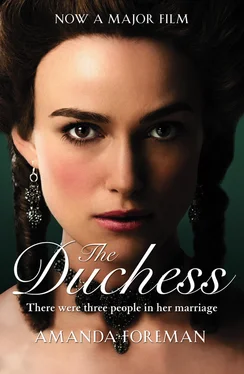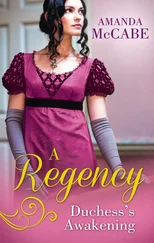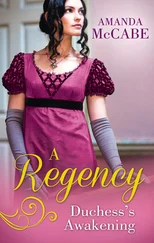At first Georgiana did not realize the danger facing the capital. Her friend Miss Lloyd, she joked, was dreaming about enraged Protestants hammering on her door.
Lord George Gordon’s people continued to make a great fracas, there is a violent mob in Moorfields, and I have learnt that five hundred guards are gone down there. I could not go to the Birthday – my gown was beautiful, a pale blue, with the drapery etc., of an embroider’d gauze in paillons. I am a little comforted for not going by the two messages I have received from Lady Melbourne and the Duke from the Prince of Wales to express his disappointment at having missed dancing with me for the 3rd time. 60
But by the next day, 6 June, the mob was on the point of taking over the city. Ministers and opposition alike hurriedly sent their wives and children out of town and prepared to mount a defence of the streets. But the magistrates were nowhere to be seen and, following a misunderstanding over which authority had the power to mandate the use of firearms against civilians, there were no troops in place. The rioting continued unchecked. The mob sacked Newgate Prison and burned down the King’s Bench. They exploded the distilleries at Holborn so that the streets were flooded with spirits and the water supply to Lincoln’s Inn Fields became alcoholic. Lord John Cavendish condemned the Lord Mayor’s cowardice in standing by while London burned to the ground. He had good reason; the mob targeted the houses of prominent Whigs because of the party’s support for religious toleration. Edmund Burke’s house was surrounded but he managed to fend them off. Sir George Savile was less fortunate and narrowly escaped being burnt to death. Poor Lord Mansfield watched as rioters looted his house and destroyed his celebrated library. The Whig grandees mounted a round-the-clock defence of their houses. Georgiana wrote on 7 June, forgetting her birthday in the midst of the chaos:
I shall go to Chiswick tomorrow, for tho’ there could be no kind of danger for me, yet a woman is only troublesome. I hope and think that it will be over tonight as the Council has issued orders that the soldiers may fire … the mob is a strange set, and some of it composed of mere boys. I was very much frightened yesterday, but I keep quiet and preach quiet to everybody. The night before last the Duke was in garrison at Ld Rockingham’s till five, which alarmed me not a little, but now Ld R’s is the safest place, as he has plenty of guards, a justice of peace, a hundred tradesmen arm’d, besides servants and friends. 61
Burke persuaded those MPs who had braved the streets to reach parliament not to revoke religious tolerance legislation, even though some sought only to placate the mob. At last, on 8 June, the army arrived and, aided by volunteers that included MPs, barristers, coalheavers and Irish chairmen, organized a well-armed defence. The mob attempted to seize the Bank of England but its defenders, ably led by Captain Holroyd, beat them off. Devonshire House was well guarded and the expected attack never came. By the ninth only pockets of resistance remained. Lord George Gordon gave himself up and was imprisoned in the Tower. Georgiana was badly shaken. ‘I feel mad with spirits at [it] all being over,’ she wrote; ‘it seems now like a dream.’ 62 She had stayed on the balcony for four nights, staring at the orange sky as Piccadilly reverberated to the sound of gunfire and explosions. The number of people killed or seriously wounded stood at 458; whole blocks of the city lay in ruins.
The immediate aftermath saw the total discrediting of the reformers and all the Association movements. The Whigs were blamed for irresponsibly fomenting discontent ‘Without Doors’ – the term for the world outside parliament. Lord North seized the political advantage and called a snap general election on 1 September. Georgiana’s assistance was demanded from many quarters: in addition to the canvassing she had to do for the Cavendishes in Derby, the Duke’s family pressured her to persuade Lord Spencer to align his interests with theirs. ‘Lord Richard is very anxious for my father to give his interest in Cambridgeshire to Lord Robert Manners, the Duke of Rutland’s brother,’ she told Lady Spencer. ‘I told him I dare say my father would, and they are very anxious as it is of great consequence to have Mr Parker wrote to directly, that he may speak to the tenants as otherwise they might be got by other people.’ 63 Her brother’s former tutor Sir William Jones, who was contesting the seat for Oxford University, also asked her to write letters on his behalf.
Sheridan wanted to become a politician, but his lack of wealth and family connections made it impossible for him to contest a seat on his own cognizance. His vanity prevented him from making a direct application to the grandees. It suited him far better to approach his target by a more circuitous route, and for this reason he pressed Georgiana to help him. Although she thought it was a shame for him to throw away his literary career, she arranged for him to stand in the Spencer-dominated borough of Stafford. He was duly elected and wrote her a grovelling letter of thanks: ‘I profited by the Permission allow’d to me to make use of your Grace’s letter as my first and best introduction to Lord Spencer’s Interest in the Town … It is no flattery to say that the Duchess of Devonshire’s name commands an implicit admiration wherever it is mentioned.’ 64 A week later, on 25 September, Charles Fox invited Georgiana to accompany him on the hustings when he contested the borough of Westminster. The press was shocked by her boldness, even though she stood on the platform for only a few minutes. The Morning Herald and Daily Advertiser made fun of her: she ‘immediately saluted her favourite candidate, the Hon. Charles James Fox. Unfortunately it happened not to be his shaving day; and when the candidate saluted her Grace, it put one in mind of Sheridan’s cunning Isaac, shaking hands with the Graces.’ 65 Fox was magnificent on the hustings, whipping up his supporters with speeches about parliamentary reform, the rights of the British people and the consequences of royal tyranny. It was on this campaign that he earned his title ‘Man of the People’.
Fox won with a comfortable majority, and his success was unexpectedly duplicated around the country. Despite its recent setbacks, the party had managed to run a well-organized election, clawing back the ground it had lost following the Gordon Riots. North’s majority was much reduced; on paper it was only 28, and he would have to rely on the independent MPs to give their support. The Whigs’ success was all the more remarkable because they had funded their campaign out of their own pockets while North had almost unlimited funds from the treasury. The nearparity of numbers convinced them that it would be only a matter of time before the government collapsed.
*Georgiana had learned the importance of ‘mixing’ from her first days of married life when the Duke had sent her off to Derby to foster good relations with the local voters. She also knew, without the Cavendishes having to tell her, that her behaviour had political implications. The year before at Brighton she wrote, ‘we are very popular here from mixing so much with the people, for Lady Sefton and Mrs Meynel never mixed with the people till we came.’
*I cannot feel at ease.
*Educated opinion excoriated the doctor as a charlatan and his patients as pathetic gullibles, but this did not prevent the credulous from seeking his help. Infertile couples paid an exorbitant £50 a night to make love on the ‘electro-magnetic bed’ in his ‘celestial chamber’ to the strains of an orchestra playing outside, while a pressure-cylinder pumped ‘magnetic fire’ into the room. It was also recommended that they drink from Graham’s patented elixir, costing a guinea a bottle. The Morning Herald and Daily Advertiser ran a successful campaign against Graham, pillorying both him and his clients and eventually he went bankrupt in 1782.
Читать дальше












